The U.S. Surgeon General, considered “the nation’s doctor,” is charged with the overall health of the nation by providing Americans with the best scientific information available on how to reduce the risk of illness and injury. Historically, this has included issuing warnings on the dangers of substance abuse, disease, and potentially hazardous personal lifestyle choices. However, current Surgeon General Dr. Vivek Murthy has shifted the focus in recent years to social concerns, including the mental health crisis and increasing rates of loneliness and isolation, which disproportionately impact the disability community. What can we do to solve these broad, complex, and often sensitive issues?
Dr. Murthy challenges us to transition from a world powered by fear and anger to one led by love, kindness, generosity, and service. Instead of hiding behind the veil of social media, he encourages candid conversations with our neighbors and unlikely acquaintances to push toward civil solutions. Communities thrive on commonalities as much as diverse ideas, perspectives, and experiences.
Issues impacting individuals who have autism and/or intellectual/developmental disabilities (A/I/DD) include access to housing, education, employment, and healthcare. They span the political spectrum – and are not issues to be divided into party lines. They involve the community at large and can only be addressed through collaborative action.
To drive awareness and spur action, the charitable nonprofit First Place AZ – through its Global Leadership Institute – launched Vote the Spectrum℠, a nonpartisan voter registration and education initiative developed to promote civic engagement and local and national collaboration. A corresponding promotional toolkit informed by valued collaborators who also participate in a series of “Spark the Spectrum” accessible voting workshops is also available to continue increasing awareness.
The following inspiring videos were created to promote this growing initiative. More information is also available here.
- We the Spectrum featuring adults with autism and their family members
- A More Perfect Union offering relevant messages from prominent state leaders
- Life, Liberty and the Pursuit of a Healthy Community representing diverse collaborators with shared interests
- Democracy Doesn’t Work Unless We Work at It – a title that speaks for itself!
- Powerful words from Richard Stengel, political analyst, former Under Secretary of State, and former managing editor of TIME
Vote the Spectrum is supported by the 1993 Voter Registration Act, enacted during a remarkable decade that included the passage of the 1990 Americans with Disabilities Act (ADA) and the 1990 Individuals with Disabilities Education Act (IDEA), renamed from the 1975 Education for Handicapped Children (EHC) Act and amended to improve transitions to post-secondary life.
With more than 1.1 million U.S. children with autism transitioning to adulthood – and voting age! – over the next 10 years, this is our moment to reignite another decade of inclusivity and accessibility. As noted by political analyst Richard Stengel (see video in the list above), Martin Luther King, Jr. reminds us that “the U.S. Constitution was a promissory note,” and it’s up to us to continually expand the circle of liberty. We do that by voting.
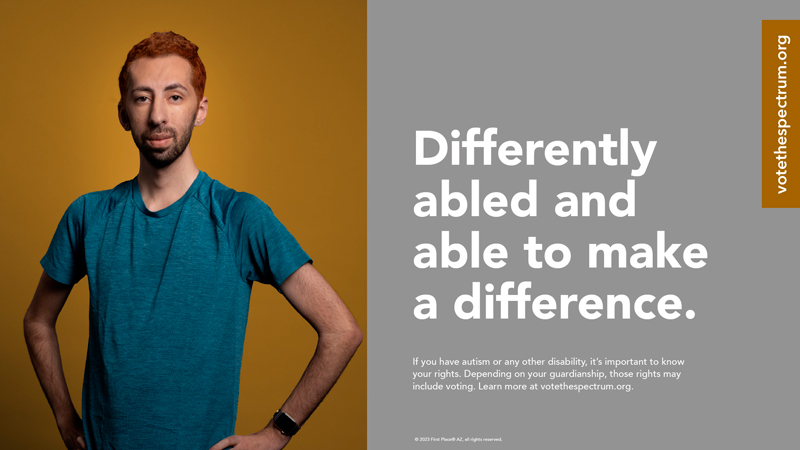
But, for many individuals with A/I/DD, voting rights and procedures remain unclear. These individuals and their loved ones deserve to be aware of their rights and the changes underway in several states, including Arizona, where a May 2024 Court of Appeals decision, Wood v. Coconino, ruled that individuals under guardianship should not automatically lose their right to vote. Prior to the decision, individuals under guardianship could only restore their voting rights if they proved they had the capacity to do so. However, the Court of Appeals agreed with the plaintiff’s argument, noting that placing the burden of proof on the ward violates the due process clause of the 14th Amendment of the U.S. Constitution. The court found that the burden of proof must be met by the petitioner seeking guardianship – whether a parent, sibling, or public fiduciary – to show that the individual lacks the capacity to vote.
To further clarify individual rights and maintain momentum in this pivotal voting year, Vote the Spectrum has received unwavering support from Arizona Secretary of State Adrian Fontes (D) and Maricopa County Recorder Stephen Richer (R). These stalwart leaders recognize what it takes to build stronger, healthier communities that work for all Arizonans.
Consider the era of cars without seatbelts and airbags, prescription medications without child-resistant caps, and unrestricted use of tobacco and consumption of alcohol without health warnings. Imagine life without federal support for the opportunity to receive an education, the ADA, or the reauthorization of the Autism CARES Act of 2024. Then, imagine life with more connected communities and a healthier population. Such protections are all attainable – and sustainable – through the power of democracy.
Now is the time to make all collective voices heard in a concerted effort to strengthen social infrastructure and community diversity through an ongoing, open dialogue that a healthy democracy empowers.
What can you do in your own community this election year and beyond to promote greater inclusivity at the ballot box? Learn more about your state’s voting rights, registration process, and election accessibility resources at vote.gov, or contact your local election officials – and VOTE!
To learn more about Vote the Spectrum, join us for “Dimensions™️,” the 13th First Place Global Symposium, in person or virtually October 16–18, 2024, in Phoenix, Arizona. We’ll explore the many dimensions that define our community and share challenges, approaches for mutual understanding – and ideas for navigating and creating the places and spaces where we want to live, work, play, and thrive.
You’ll be among many other trailblazers and courageous leaders for three grounding, informative, and fortifying days as we work together to fuel a new marketplace of housing, healthcare, and community options for adults with A/I/DD.
Denise D. Resnik is founder and president/CEO of First Place® AZ, a charitable 501(c)(3) advancing innovative residential, healthcare, and community options for adults with autism and other neurodevelopmental disabilities. She is also mom to Matt, an adult with autism, and her North Star.
For more information, visit firstplaceglobal.org, email denise@firstplaceaz.org, or call (602) 228-3928.

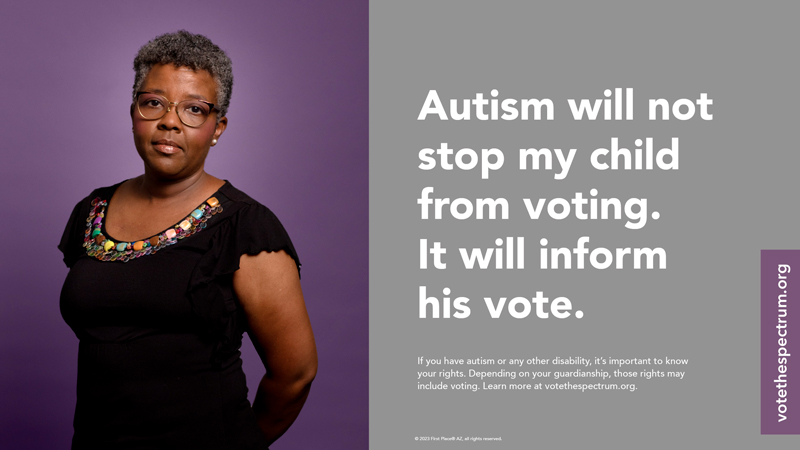
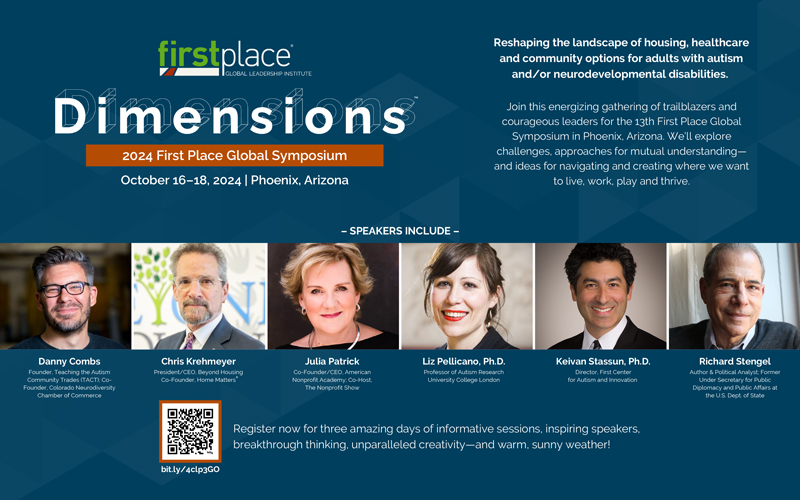
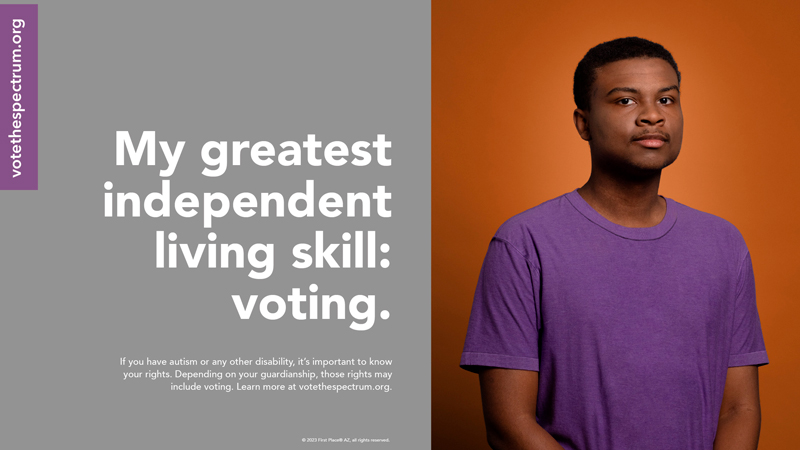
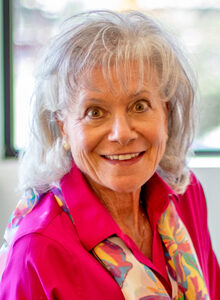



I’m autistic but have never, ever had trouble voting.